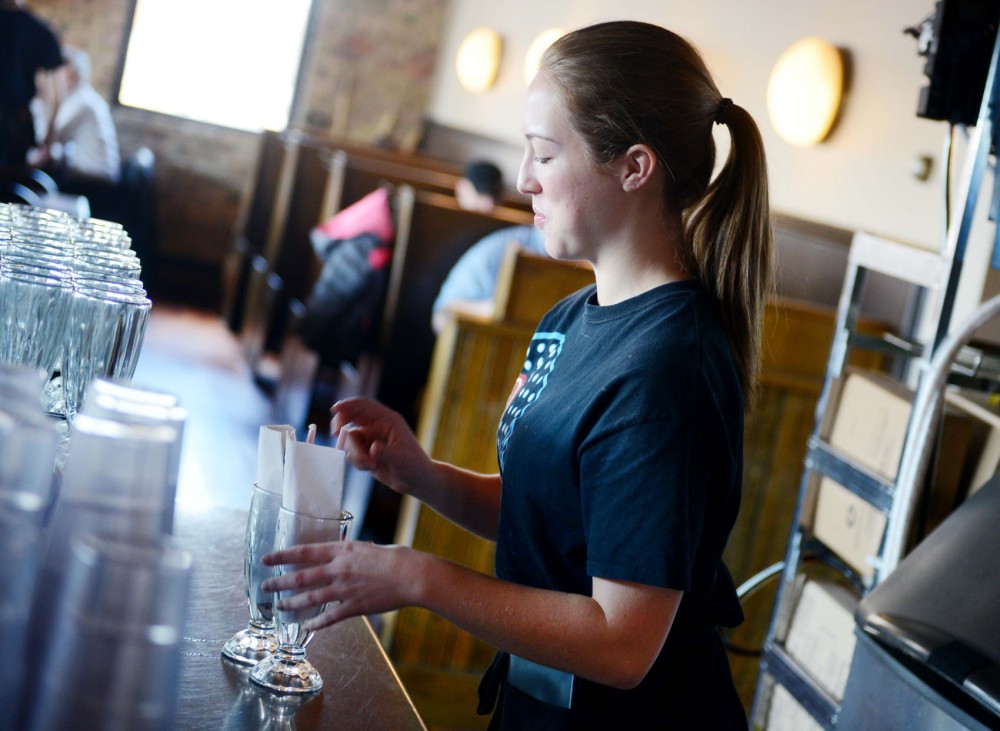As lawmakers nationwide debate the pros and cons of a minimum wage increase, many business owners have drawn a firm tally mark on the “con” side — and those in the University of Minnesota area are no exception.
While advocates for the increase say it’ll spur the economy by putting more money in workers’ pockets, opponents say the hike is unnecessary and could hurt businesses.
Bills in both the Minnesota House and Senate are gaining traction to increase the state’s minimum wage by 2015 and are likely to pass this session. A House-Senate conference committee met briefly on Tuesday to try to reconcile the different versions.
The proposed increase would raise the minimum wage to $9.50, one of the highest levels in the nation.
Minnesota currently ranks among the lowest minimum wage rates in the country at $5.25 for small employers — those that make less than $625,000 per year — and $6.15 for large employers. It’s one of only four states with minimum wage rates lower than the federal minimum of $7.25.
President Barack Obama announced in January’s State of the Union address his intention to increase the federal minimum wage dramatically to $10.10, prompting a national call to action.
Rep. Ryan Winkler, DFL-Golden Valley and chief author of the House’s minimum wage bill, said he hopes it will pass within the next couple of weeks after negotiations with the Senate are ironed out. He said the bill would give 360,000 Minnesotans a pay raise and is long overdue.
The minimum wage was last raised in Minnesota in 2005 and nationally in 2007. Winkler said businesses have complained about minimum wage since it was first instituted in 1938.
“Each time we raise it, the business community says they can’t afford it,” he said, “but each time, our economy grows … and so there’s really no evidence that raising the minimum wage is harmful to business.”
Marketing sophomore Erika Elliott, a barista at Caribou Coffee on University Avenue Southeast, said she started at $7.75 an hour. She has since had multiple raises, she said, which has made her life less stressful.
With her uptick in income, Elliott said, she can afford more of her rent and doesn’t have to take out as many student loans.
“I’m not having to worry as much and able to do more fun stuff with my friends,” she said. “Having extra cash is always a plus.”
Elliott said she noticed a major difference in her quality of life since the pay raise to a rate of $10.20 per hour — nearly the same amount lawmakers and the president are proposing. She said it’s especially important for college students, who aren’t able to work as many hours with a full-time class schedule.
John Rimarcik, who owns several restaurants in the Twin Cities, including Annie’s Parlour in Dinkytown, said the wage increase is not feasible for restaurant owners. He pays most of his “several hundred” employees the federal minimum wage, he said, and the proposed surge would cost him more than $200,000 per year.
Rimarcik said implementation of the new law will force restaurants to cut employees, while remaining workers will see their hours trimmed “substantially.” Restaurants will have to take drastic measures to balance the change, he said.
“You have to adjust your hiring standards, your number of people on payroll and the hours that they work,” he said. “It hurts each individual somewhat proportionately.”
Rimarcik said he’d like to see tips factored into the wage scale. When added into an employee’s pay, tips put restaurant workers well above minimum wage, he said.
Unlike numerous other states, Minnesota does not have a lower minimum wage for workers who get tips.
Blarney Pub and Grill owner Mike Mulrooney said he, too, wants state legislators to count tips as income. He said increasing the minimum wage of restaurant employees will immediately hurt consumers, as restaurants will counter the measure with higher prices.
But Elliott said she doesn’t think financial strain is a valid excuse from employers. Business owners make plenty, she said, and the middle-class workforce is due for a raise.
“I don’t think this increase would make them go out of business,” she said. “I think it’s more them not wanting to spend the money.”

















